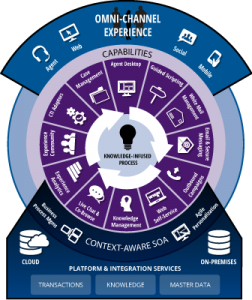How thoughtful approaches to AI can lead to financial empowerment for all
Capital One president reveals harnessing AI can help the financial services industry advance wealth-building—through greater accessibility, personalization, and inclusivity
Every person’s path to financial empowerment is uniquely their own, marked by distinct challenges and triumphs. Collectively, one truth remains universal: the road can be uncertain, and not everyone has the same support and resources. However, with recent technological advances, financial empowerment has reached a new inflection point.
So, how can we harness this technology to guide us toward financial equity and inclusion? At Capital One, as a full-service, technology-driven bank, we envision artificial intelligence (AI) as an enabler to unlocking a new frontier of banking for good. Through AI, the banking industry has the potential to lower friction within the customer experience and enhance financial tools and opportunities.
WHERE AI MEETS FINANCIAL WELL-BEING
Financial well-being exists when people’s daily financial systems enable them to be resilient and pursue opportunities. To build financial well-being, individuals must first understand and make informed decisions to manage their financial health fundamentals: spending, saving, borrowing, and planning. However, research shows that traditionally underserved groups—such as people of color, women, and young adults—have sometimes faced barriers when it comes to accessing financial tools and resources that support financial health, indicating a need for improved access to finance services that cater to diverse community needs and preferences.
AI has the ability to provide personalized financial guidance based on the analysis of individual spending patterns. It can also offer intelligent insights into banking solutions tailored to an individual’s unique needs, helping these consumers gain access to financial services using digital tools. Those financial services include things like customer service virtual assistants, personalized fraud defenses, and intelligent payment solutions. But we’re just scratching the surface. AI is poised to transform nearly every aspect of financial services and simultaneously build bridges to financial empowerment. Still, it requires human empathy and ingenuity to develop technology that works in the best interests of all customers.
ESTABLISHING TRUST BY PRIORITIZING PEOPLE
Earning customers’ trust is critical for financial service providers. Leveraging AI in a thoughtful, well-managed way is the industry’s first step in gaining that trust. At Capital One, our founding as a company was based on using technology, data, and analytics to tailor products and services to customers’ needs. As a bank, Capital One is a highly regulated company where compliance and risk management are core to our business model. As such, we’re programmed to apply the same level of safety and responsibility to all emerging innovations, including the use of AI.
Throughout our history, we have taken a rigorous and thoughtful approach to technology development to help us unlock insights, make decisions, and drive innovation and value for customers. As part of this journey, we became the first U.S. bank to go all in on the cloud, enabling us to leverage data and technology more nimbly and effectively than ever before. That foundation is critical to our ability to leverage the next frontier of AI to drive innovation with impact at scale. For example, our customer service capabilities leverage a voice-to-text speech recognition system to provide personalized support to each customer based on their interaction history. Similarly, our fraud detection platform uses real-time data and machine learning to spot and mitigate suspicious activity, all in the time it takes a customer to swipe their credit card.
When thoughtfully developed and deployed, new AI capabilities bring the potential for our industry to deliver these types of benefits to everyone, everywhere. Whether that be older adults navigating new technologies, younger generations learning how to manage money, and low to moderate-income (LMI) customer segments seeking access to more financial resources—all have a significant amount to gain. For example, conversational AI can complement traditional banking services by offering added support and engagement to customers anywhere they happen to be. This technology enables financial institutions to extend their reach, providing timely customer care across any channel to meet customers where they are.

While AI offers new avenues for engagement, it’s not a one-size-fits-all approach to supporting LMI markets. Nonprofit organization Commonwealth is exploring new opportunities by conducting a year-long research study on how conversational AI can be deployed alongside existing services to fulfill the unique needs and preferences of LMI banking customers, particularly in enhancing credit counseling services.
DEMOCRATIZING ACCESS TO WEALTH-BUILDING ADVICE
At Capital One, we’ve joined the Partnership on AI (PAI), a leading independent, nonprofit partnership of academic, civil society, and industry stakeholders seeking to address the world’s most important questions concerning the future of AI. Through this partnership, we are contributing to research on the development of AI in the banking industry to identify how enterprises should be thinking about developing and deploying AI platforms to unlock broader societal benefits and opportunities.
As AI-powered experiences continue to evolve, they have the potential to become a powerful bridge to financial empowerment. Through greater accessibility, personalization, and inclusivity, the financial services industry can further enable financial empowerment for all.
(5)




